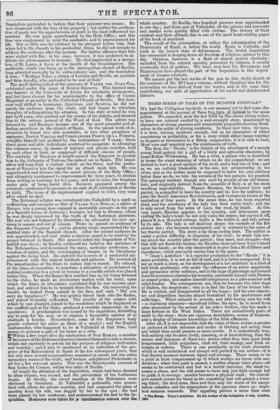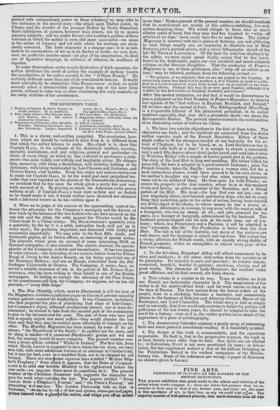THIRD SERIES OF TALES OF THE MUNSTER FESTIVALS.*
WE had the Collegians too fresh in our memory not to feel some disappointment at the perusal of these two tales_..ofjx.eland_by the same author. We expected, as in the last work by this clever young writer, to have our interest excited by a well-wrought story, maintained by characters of strong passions and remarkable properties showing them selves in the midst of stirring incidents. In these new tales, we have, it is true, stirring incidents enough, but as for characters of either consistency or probability, or for a story which either hangs together in its parts or terminates in a fitting anagnwrisis, it is in vain to look. Most vain and impotent are the conclusions of both. The first, the" Rivals," is the history of the attachment of a moody young Irish patriot, for a girl of a lively and agreeable character, by name Esther Wilderming. He has a rival, a person who is described in terms the exact meaning of which we do not comprehend: we are desired to have a good opinion of his rival, and a bad one of him; and as we see nothing blameable in the one, nor praiseworthy in the other, and as the author must be supposed to know his own children better than we do, we take his version of the two persons for granted. The principal incident, though one used by several of our old dramatists, and originally derived from the nouvelle of Italy, is of the most revolting improbability. Francis Riordan, the favoured lover and patriot, is compelled to leave his country and his love for sedition; he joins the South American Revolutionists, and ventures to return at the expiration of four years. In the mean time, he has been reported dead, and the constancy of the lady has been sorely tried; and she is only saved from the arms of Lacy, the rival, by death. At this very epoch, Riordan appears in the country, and determines ,upon visiting the lady's tomb: he not only visits the corpse, but carries it off, places it in a deserted cottage, lights a fire before it, and falls asleep by its side. The lady is not dead but sleep: the warmth of the fire revives her; she becomes reanimated, and is restored to.the arms of her frantic patriot. The story is far from endine. here. The author is under a grand difficulty in disposing of the rival : he sends him ravine-" about the country after the patriot ; they meet, and struggle—but that will not finish the history, for Riordan must not have Lacy's blood upon his hands ; so the only means left is to give him a fit of illness and repentance, which gradually carries him to the grave. ""Tracy's Ambition" is a superior production to the "Rivals :" it is more probable, it is not so full of rant, and it is better compacted. It is not so much a story, as the development of a low ambition in a kind of half Irish gentleman, who under the influence of an active magistrate and persecutor of the seditious, and in the hope of patronage and reward from Governmentalienates his tenantry, surrounds himself with Peelers or armed police, and makes himself conspicuous as a pike-searcher and rebel-hunter. The consequences are, that he becomes the utter dupe of Dalton, the magistrate ; who is in fact the Lacy of the former tale. He is robbed, and disappointed in all his hopes ; and his own character and disposition become almost brutalized by his misfortunes and sufferings. When reduced to poverty, and after having seen his wife —a charming character---murdered before his eyes, he is saved from utter abasement by the arrival of his wife's brother, who has made a large fortune in the West Indies. There are undoubtedly parts of merit in the story : there are vigorous descriptions scenes of humour, and a display of intimate knowledge of the Irish cif:erecter. After all, it is not impossible that the value of these stories is greater as pictures of Irish manners and modes of thinking and acting, than any which they could possess as mere novels. It is undoubtedly true, that nothing can be more lively, amusing, or at least striking, than the scenes and dialogues of these two stones when they turn upon Irish temperament, Irish prejudices, Irish wit, Irish wrongs, and , Irish at tempts at redress. There is one peculiarity in the Irish character which is well understood and always well painted by our author—it is that fearful moment between injury and revenge. There seems to be a point in Irish teinperament up to which wrongs are borne with moderation; when that point is passed, a sudden change takes place—all seems to be overturned and lost in a horrid darkness, the mind be comes a chaos, and the will seems to have only just light enough left to guide it to revenge : murder becomes a physical want ; the convul sive wretch craves for blood as for something that will quench a burning thirst: the deed done, then and then only the storm of the imagination subsides, and the atmosphere of the passions clears up: impotent remorse succeeds. Thie appalling picture is more than once
1630 Rivals. Tracra Ambition. By the Anther of the Collegians. 8 vols. Louden, .
painted with extraordinary power in these volumes f we may refer to two instances in the second story—the attack upon Dalton senior, by Clancy, and the murder of the younger Dalton by Molly Shanahan. Such exhibitions of passion, however truly drawn, are by no means pleasing subjects ; and we prefer for our own reading a portion of these volumes in which the author is even still more successful—we mean in the sallies of humour and wit with which his writings are abundantly seasoned. The Irish character is a strange one—it is as brilliant in its coruscations of wit as in its flashes of wrath : we Own, however, we prefer the merrier mood—its play of the imagination, its droll use of figurative language, its richness of allusion, its readiness of repartee. In some Observations on the novels illustrative of Irish manners, the author attributes the credit of setting the example of making known the peculiarities of his native country to the " O'Hara Family." He certainly defrauds more than one of no considerable honour. It might most undoubtedly be claimed for Miss EDGEWORTH : in fact, we could scarcely select a characteristic passage from any of the later Irish novels, without in some way or other illustrating her early remarks or her early sketches of her countrymen.



















 Previous page
Previous page